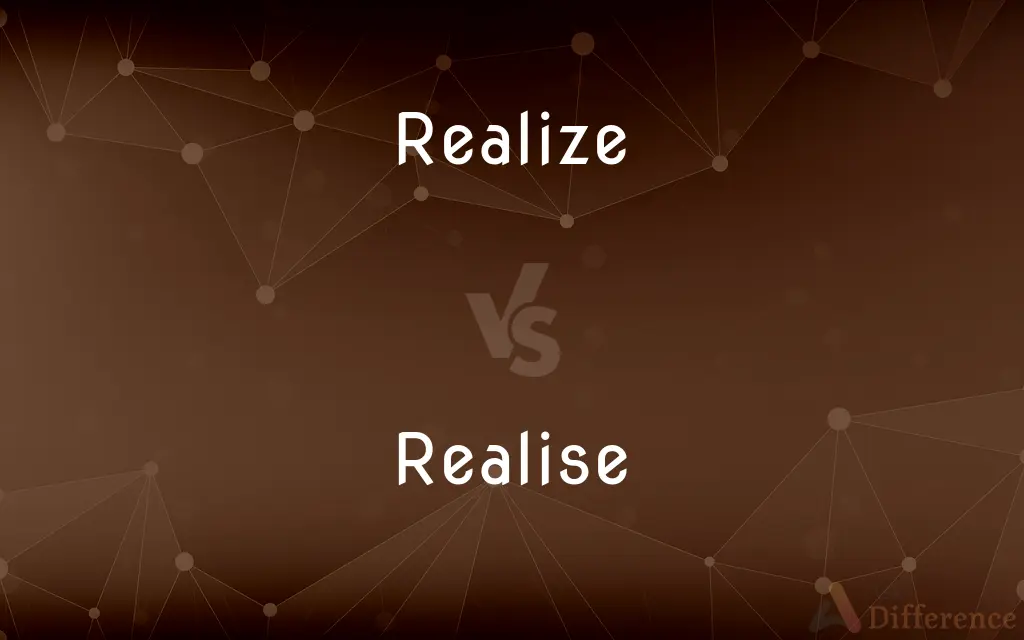Realize vs. Realise — What's the Difference?
By Tayyaba Rehman — Published on December 30, 2023
Realize and realise mean the same: to become aware of. "Realize" is American English, while "realise" is British English.

Difference Between Realize and Realise
Table of Contents
ADVERTISEMENT
Key Differences
"Realize" and "realise" both denote the act of becoming consciously aware of something or understanding a particular fact or situation. They carry the same fundamental meaning.
The distinction between "realize" and "realise" rests solely in their spelling. This difference stems from variations in American and British English. Both words convey identical meanings and are used interchangeably, depending on the regional language preference.
In American English, "realize" is the preferred and standard spelling. When writing or speaking in an American context, this spelling would be the correct and expected choice.
Conversely, "realise" finds its roots in British English. If one were writing for a UK audience or in a British context, "realise" would be the suitable choice.
Despite the spelling divergence between "realize" and "realise," the pronunciation of both words remains largely consistent. Regardless of the 'z' or 's', they sound essentially the same.
ADVERTISEMENT
Comparison Chart
Spelling Origin
American English
British English
Usage Locale
Primarily used in the USA and countries following American English.
Primarily used in the UK and countries following British English.
Common Letter
Contains the letter "z".
Contains the letter "s".
Pronunciation
/ˈriː.ə.laɪz/
/ˈriː.ə.laɪz/
Meaning
To become aware of.
To become aware of.
Compare with Definitions
Realize
To achieve something desired or anticipated.
She finally realized her dream of becoming a doctor.
Realise
To convert into cash or money.
They sold their property to realise funds for the new project.
Realize
To cause something to happen.
His negligence might realize our worst fears.
Realise
To make something real or actual.
The director realised the play's potential with his unique interpretation.
Realize
Become fully aware of (something) as a fact; understand clearly
They realized that something was wrong
He realized his mistake at once
Realise
To bring about or effectuate.
His carelessness could realise unwanted consequences.
Realize
Cause to happen
His worst fears have been realized
Realise
To understand or become conscious of something.
It was only later that she realised the gravity of her mistake.
Realize
Give actual or physical form to
The stage designs have been beautifully realized
Realise
To accomplish or bring to fruition.
After years of hard work, he realised his ambition.
Realize
Make (a profit) from a transaction
She realized a profit of $100,000
Realise
Standard spelling of realize
Realize
To comprehend completely or correctly.
Realise
Earn on some commercial or business transaction; earn as salary or wages;
How much do you make a month in your new job?
She earns a lot in her new job
This merger brought in lots of money
He clears $5,000 each month
Realize
To bring into reality; make real
He finally realized his lifelong ambition to learn how to play the violin.
Realise
Convert into cash; of goods and property
Realize
To make realistic
A film that realizes court life of the 1600s.
Realise
Expand or complete (a thorough-based part in a piece of baroque music) by supplying the harmonies indicated in the figured bass
Realize
To obtain or achieve, as gain or profit
She realized a substantial return on the investment.
Realise
Make real or concrete; give reality or substance to;
Our ideas must be substantiated into actions
Realize
To bring in (a sum) as profit by sale.
Realise
Be fully aware or cognizant of
Realize
To exchange holdings or goods for money.
Realise
Perceive (an idea or situation) mentally;
Now I see!
I just can't see your point
Does she realize how important this decision is?
I don't understand the idea
Realize
To make real; to convert from the imaginary or fictitious into reality; to bring into real existence
The objectives of the project were never fully realized.
Realize
(transitive) To become aware of (a fact or situation, especially of something that has been true for a long time).
He realized that he had left his umbrella on the train.
The defendant desperately yelled at her young daughter, frantic to make her realize what she had done.
Realize
(transitive) To cause to seem real to other people.
Realize
(transitive) To sense vividly or strongly; to make one's own in thought or experience.
Realize
To acquire as an actual possession; to obtain as the result of plans and efforts; to gain; to get
To realize large profits from a speculation
Realize
To convert any kind of property into money, especially property representing investments, such as shares, bonds, etc.
Profits from the investment can be realized at any time by selling the shares.
By realizing the company's assets, the liquidator was able to return most of the shareholders’ investments.
Realize
To convert into real property; to make real estate of.
Realize
To turn an abstract linguistic object into actual language, especially said of a phoneme's conversion into speech sound.
The southern /v/ is realized as the voiced approximant [ʋ].
Realize
To make real; to convert from the imaginary or fictitious into the actual; to bring into concrete existence; to effectuate; to accomplish; as, to realize a scheme or project.
We realize what Archimedes had only in hypothesis, weighing a single grain against the globe of earth.
Realize
To cause to seem real; to impress upon the mind as actual; to feel vividly or strongly; to make one's own in apprehension or experience.
Many coincidences . . . soon begin to appear in them [Greek inscriptions] which realize ancient history to us.
We can not realize it in thought, that the object . . . had really no being at any past moment.
Realize
To convert into real property; to make real estate of; as, to realize his fortune.
Realize
To acquire as an actual possession; to obtain as the result of plans and efforts; to gain; to get; as, to realize large profits from a speculation.
Knighthood was not beyond the reach of any man who could by diligent thrift realize a good estate.
Realize
To convert into actual money; as, to realize assets.
Realize
To convert any kind of property into money, especially property representing investments, as shares in stock companies, bonds, etc.
Wary men took the alarm, and began to realize, a word now first brought into use to express the conversion of ideal property into something real.
Realize
Be fully aware or cognizant of
Realize
Perceive (an idea or situation) mentally;
Now I see!
I just can't see your point
Does she realize how important this decision is?
I don't understand the idea
Realize
Make real or concrete; give reality or substance to;
Our ideas must be substantiated into actions
Realize
Earn on some commercial or business transaction; earn as salary or wages;
How much do you make a month in your new job?
She earns a lot in her new job
This merger brought in lots of money
He clears $5,000 each month
Realize
Convert into cash; of goods and property
Realize
Expand or complete (a thorough-based part in a piece of baroque music) by supplying the harmonies indicated in the figured bass
Realize
To become fully aware of something as a fact.
I didn't realize how late it was until the sun set.
Realize
To convert assets into cash.
The company aims to realize its investments next quarter.
Realize
To bring into concrete existence.
The architect realized the vision of the client beautifully.
Common Curiosities
Can I use "realize" when writing for a British audience?
Ideally, use "realise" for a British audience for consistency.
Is it wrong to use "realise" in American English?
While understood, "realize" is the standard American spelling.
Do "realize" and "realise" have the same meaning?
Yes, they both mean to become aware of something.
Why are there two spellings: "realize" and "realise"?
"Realize" is American English, and "realise" is British English.
Are there other words with similar American and British spelling differences?
Yes, like "color" (American) and "colour" (British).
Is one spelling older than the other: "realize" or "realise"?
Both have roots in older forms of English; their current spellings reflect regional preferences.
Is there a grammatical difference between "realize" and "realise"?
No, only a spelling difference based on regional English variations.
Are there any contexts where "realize" and "realise" shouldn't be used interchangeably?
Formal contexts, publications, and region-specific writing should adhere to the respective regional spelling.
Is the pronunciation different for "realize" and "realise"?
No, both words are pronounced the same way.
Which countries predominantly use "realise"?
The UK, Australia, New Zealand, and other British English-influenced countries.
Do "realize" and "realise" have other meanings besides awareness?
Yes, they can also mean to achieve a goal or to convert assets to cash.
Are "realize" and "realise" verbs or nouns?
Both are primarily used as verbs.
In the digital age, do these spelling differences still matter?
Yes, regional spelling preferences remain important for formal writing and publications.
Which form is used in international English exams like IELTS or TOEFL?
IELTS accepts both forms but lean towards British English. TOEFL leans towards American English, using "realize".
Can I interchange "realize" and "realise" in a single piece of writing?
For consistency, stick to one spelling style throughout a document.
Share Your Discovery

Previous Comparison
Categorised vs. Categorized
Next Comparison
Buho vs. LechuzaAuthor Spotlight
Written by
Tayyaba RehmanTayyaba Rehman is a distinguished writer, currently serving as a primary contributor to askdifference.com. As a researcher in semantics and etymology, Tayyaba's passion for the complexity of languages and their distinctions has found a perfect home on the platform. Tayyaba delves into the intricacies of language, distinguishing between commonly confused words and phrases, thereby providing clarity for readers worldwide.













































